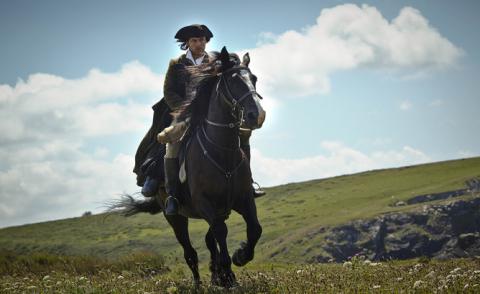The BBC has revived Poldark, last seen on British screens in 1977. It clearly hopes that the story of an impoverished gentleman returning from the American revolutionary wars to find his Cornish family seat in ruins, the county in turmoil and his true love about to marry another will again beguile audiences.
The original Poldark came, much like today, amidst a tsunami of historical dramas. A strong element of Poldark’s appeal was visual, as is the case with most period dramas. The Cornish landscapes, costumes and interiors gave audiences a strong sense of time and place. The series also benefited from the brooding presence of Ross Poldark, in tight breeches, boots and flowing shirts, a role that made Robin Ellis widely known as “the sexiest man on the telly”.
A strongly melodramatic storyline was also a significant factor in the show’s popularity – although it meant critics refused to take it seriously. One viewer thought Poldark “a good old-fashioned romance with the villain getting his come-uppance”. If some at the BBC were embarrassed by the over-the-top acting on display, critics claimed it was “a great show for those who abhor surprises and clever-cleverness and like to know where they stand”. The Spectator’s television critic Jeffery Bernard claimed to love the series, even though it was “a load of rubbish”. “What I like about Poldark was the lack of a message,” he wrote.
This was not entirely fair. Some erratic accents were on display (and given last year’s Jamaica Inn, we can probably expect these again) – and Christopher Biggins as a randy vicar was always going to lack conviction – but to say Poldark lacked a message is just plain wrong.
Radical romance
Poldark was actually one of the most radical period dramas of its day, reflecting the influence of the novels written by Winston Graham on which it was based. The first Poldark novel was published in 1945, the year Britain elected a Labour government intent on building a more egalitarian society. Graham’s work was shaped by that context.
His villains are the Warleggans, described in the novel as the “new aristocracy”. These financiers-cum-industrialists are the “the people of the future”, monopoly capitalists in all but name, intent on destroying communities to earn a profit, and able to exploit a legal and political system that reflects their interest. Against them stands Poldark, who, as an impoverished squire, gestured to a more classless past in which squire and tenant shared the same economic interests. As Graham wrote in Ross Poldark (1945): “All men were born in the same way: no privilege existed which was not of man’s own contriving.”
Ross Poldark was, then, one of literature’s classic figures on the fringe, a man of noble birth who identifies with the people rather than with his own class. As a kind of 18th century Robin Hood, Poldark’s romantic life echoes his ambiguous place in the social order – he eventually marries Demelza, his own maid (but continues to hanker for the more elevated Elizabeth). Reflecting the character of Graham’s novels, the television series has Poldark lead the people’s struggle against monopoly capitalism, depicting miners’ strikes and bread riots as instances of righteous resistance against a corrupt establishment.
In doing so Poldark popularised the kind of radical history then being written by the Marxist historian E P Thompson, who highlighted the rapacious nature of 18th century market relations. But Ross Poldark was not quite a socialist. The hero was instead a One Nation figure, a man of elevated birth who considered he had responsibilities to look after his tenants and workers: he believed in competition so long as it was “fair”.
A modern Poldark
Of course, the romance and swashbuckling took centre stage, and as far as I can tell few viewers consciously appreciated Poldark’s lessons in political economy. But it’s unlikely that these had no impact: we certainly know that other fictional versions of the past can shape how audiences think of the actual past.
The first episode of the revived series suggests it will remain faithful to the original formula. And thanks to the more developed cinematic techniques of contemporary television, it exploits with even greater enthusiasm the beauties of the Cornish coastline. The ominous Warleggans have appeared and the signs are that Ross Poldark will again stand up to their immoral capitalism.
If so, perhaps the new series will make more of a political impact than did the old, especially with an election looming into view. For, more than in the 1970s, contemporary Britain resembles the world of Poldark, with elites of various sorts appearing to run roughshod over laws and morals in pursuit of advantage, the people helpless to stop them. Like the Warleggans in Poldark’s fictional past, bankers today commit crimes and still prosper.
Ross Poldark is of course a fantasy figure, an imaginary solution to real problems: there are few men of noble origins who have ever had the people’s interest genuinely close to their heart. But perhaps there is a real political force out there, able to tap into their inner Poldark. One can only hope.


Spread the word